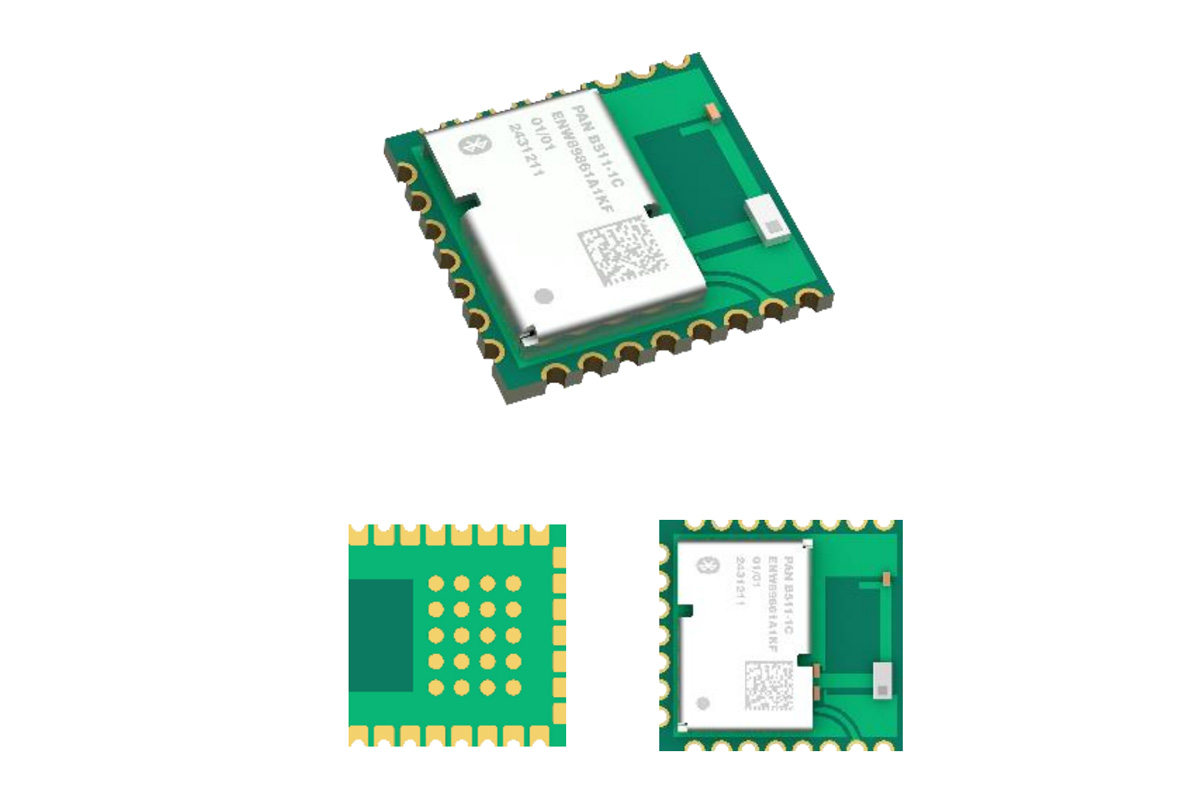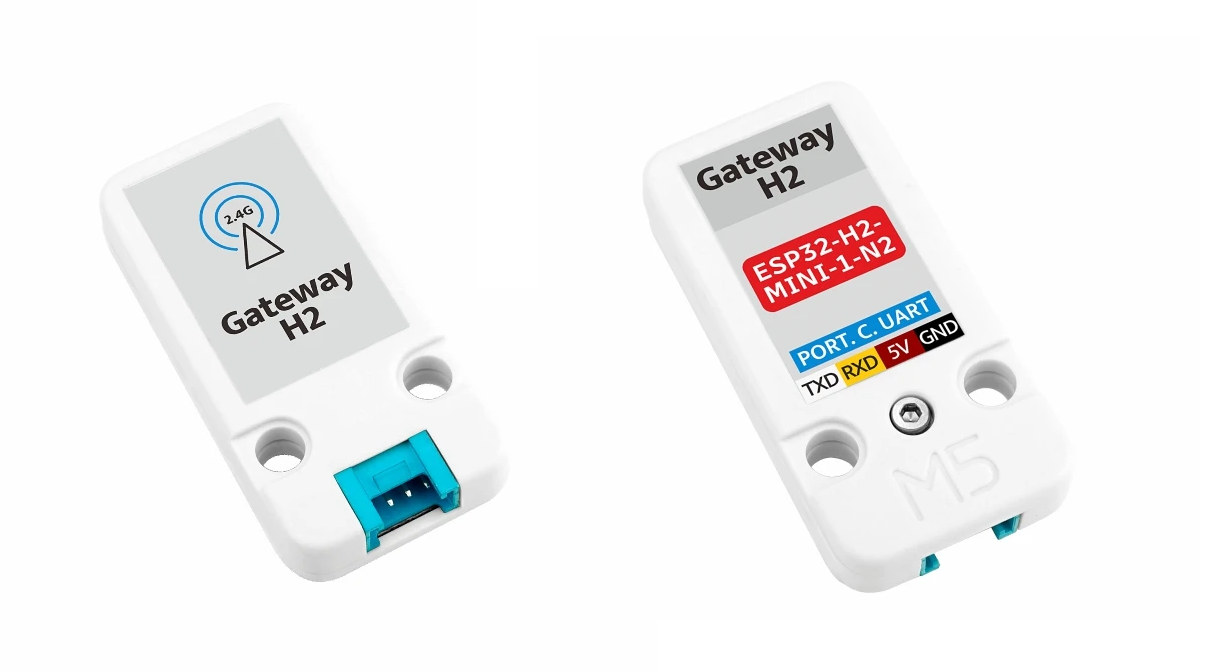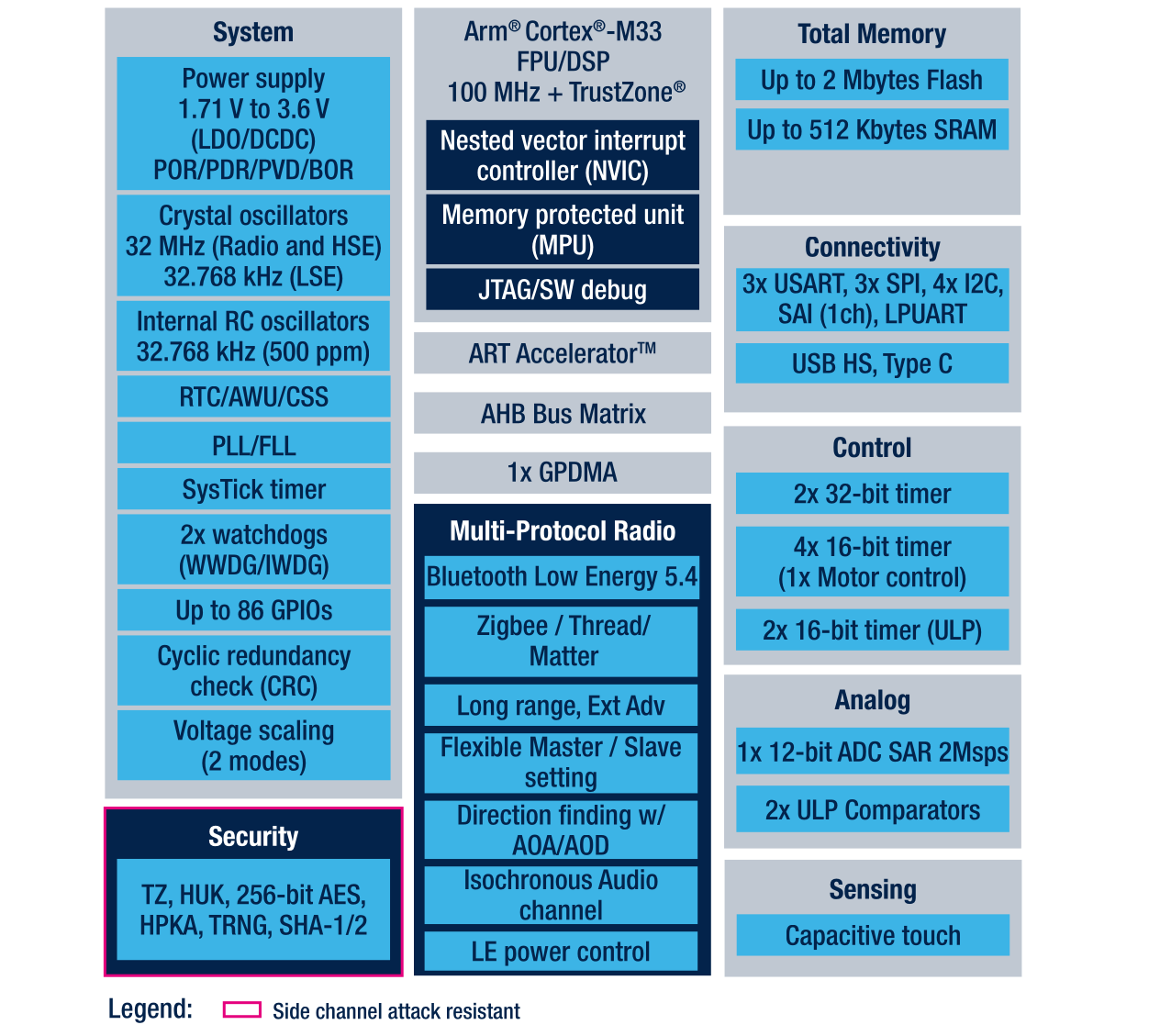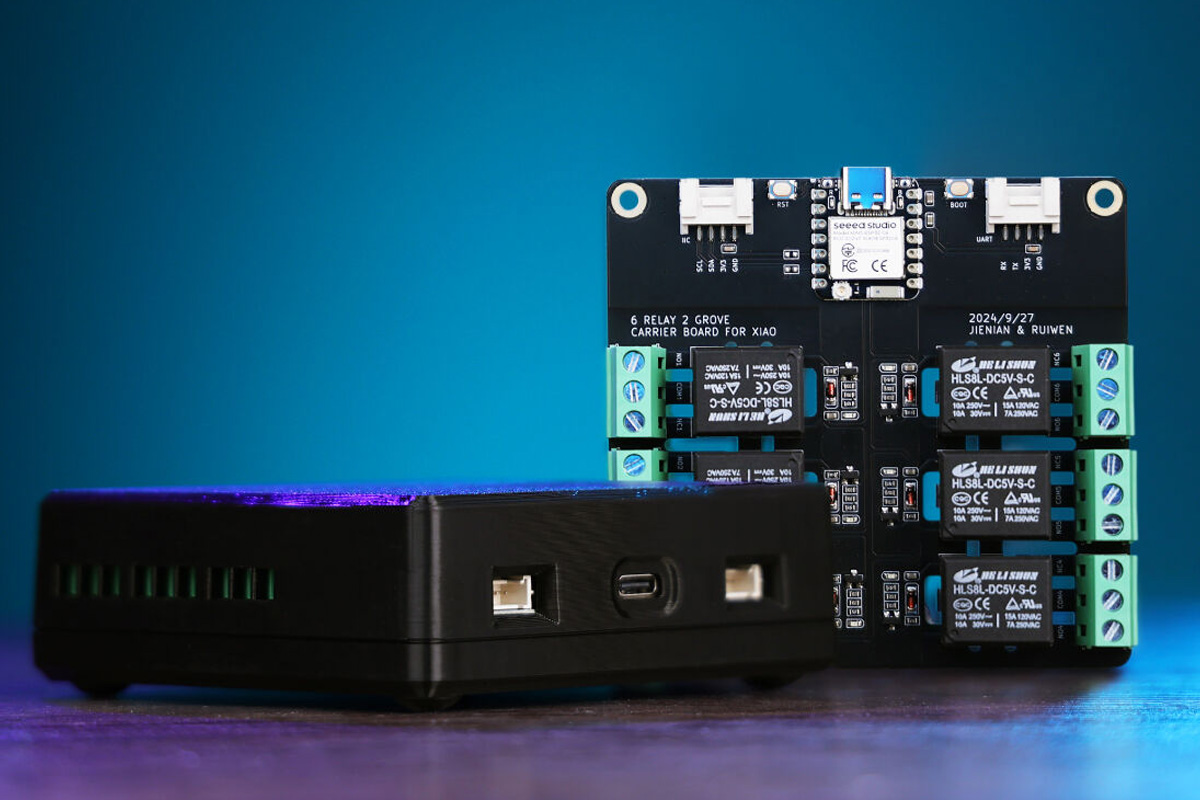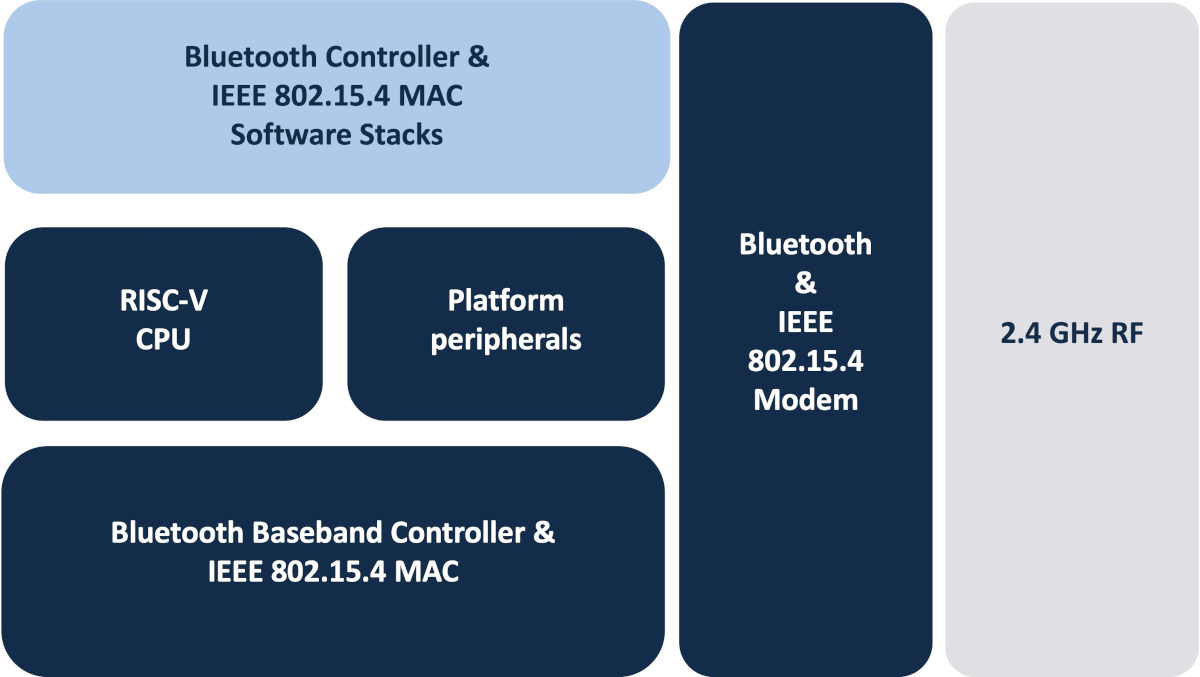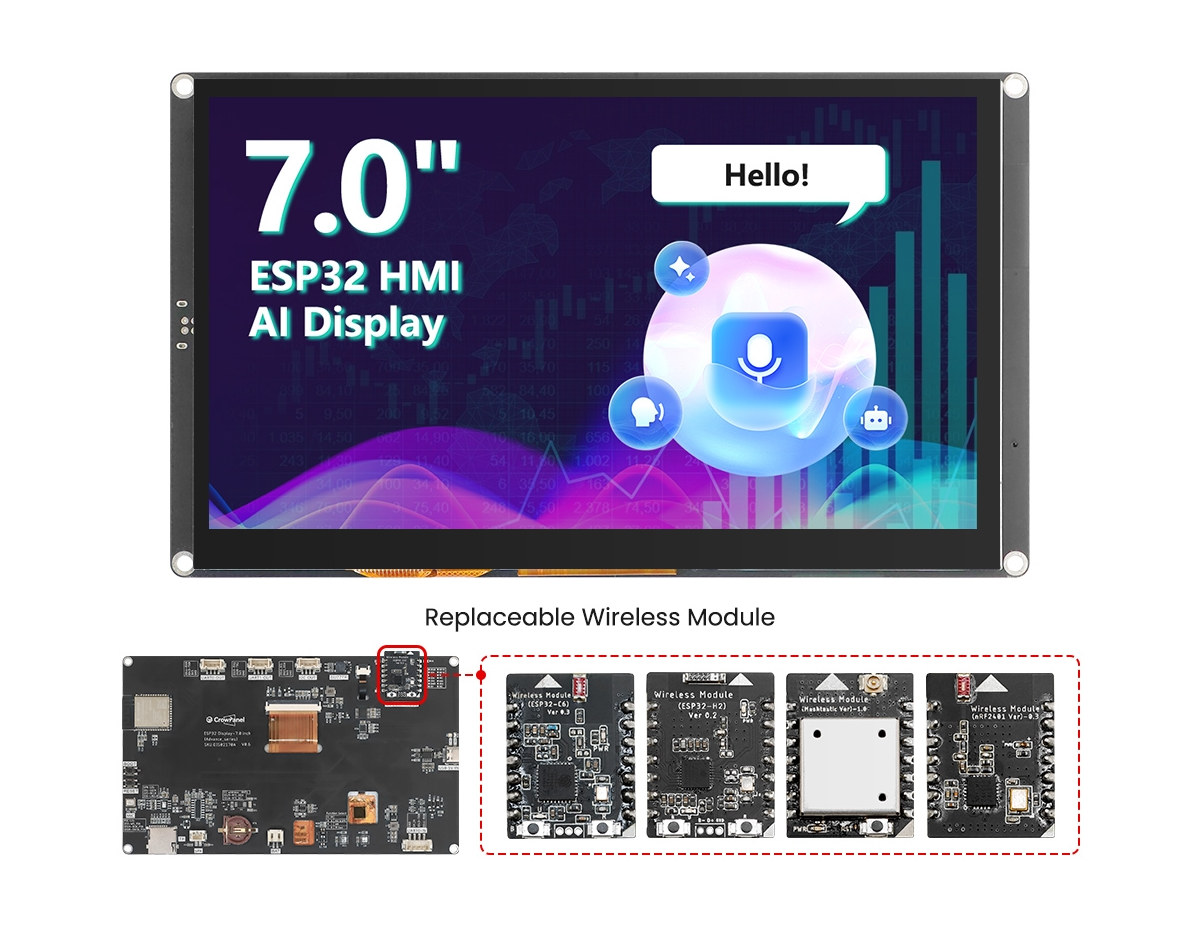Panasonic industry has recently introduced the PAN B511-1C Bluetooth 6.0 and 802.15.4 module based on the Nordic Semi nRF54L15 SoC and designed for ultra-low-power wireless communication. The compact module integrates a chip antenna, 32MBit flash memory, two Crystals, and the Nordic nRF54L51 which provides a 128 MHz Arm Cortex-M33 microcontroller with Bluetooth 6.0 (LE), Thread, Zigbee, and Matter, along with multiple peripherals such as SPI, UART, I2S, PWM, and ADC. The PAN B511-1C also implements security features to support secure boot, secure firmware updates, cryptographic acceleration, and tamper detection, making it suitable for a range of IoT, industrial automation, smart home, medical (wearables), and battery-powered applications. PAN B511-1C module specification: SoC – Nordic Semiconductor nRF54L15 MCU cores Arm Cortex-M33 with Arm TrustZone @ 128MHz RISC-V coprocessor for software-defined peripheral Memory – 256KB SRAM Storage – 1.5MB non-volatile memory Wireless Bluetooth 6.0 Data rates – 2Mbps, 1Mbps, 500kbps, 125kbps Features AoA / […]
M5Stack Unit Gateway H2 – A tiny ESP32-H2 Thread/Zigbee gateway selling for $6.50
M5Stack’s Unit Gateway H2 is a small Thread/Zigbee gateway powered by the ESP32-H2-MINI-1 module with an 802.15.4 radio for Zigbee 3.0, Thread 1.3, and Matter connectivity. The Unit Gateway H2, also known as Gateway H2 Unit…, can operate as a gateway (e.g. a Thread Board Router) or a terminal device that communicates with a M5Stack device via serial/UART through the Grove interface. It also features a USB-C port for power, firmware flash, and debugging. M5Stack says it’s suitable for smart homes, environmental monitoring, sensor networks, and low-power wireless communication nodes. M5Stack Gateway H2 Unit specifications: Wireless module – ESP32-H2-MINI-1-N2 SoC – Espressif Systems ESP32-H2 CPU – 32-bit RISC-V SoC clocked at up to 96 MHz RAM and storage – 320 KB SRAM, 128 KB ROM, 4 KB LP memory Wireless – 802.15.4 radio with Zigbee 3.0, Thread 1.3, and Matter support. (Note: the ESP32-H2 also supports Bluetooth 5.2 LE/Mesh, […]
STMicro STM32WBA6 2.4 GHz wireless MCU gets up to 2MB flash, 512KB SRAM, USB OTG, and more
STMicro had two announcements yesterday. I’ve already covered the launch of the ultra-low-power STM32U3 microcontroller family, so today, I’ll check the new 100 MHz STM32WBA6 Cortex-M33 wireless MCU family with 2.4GHz radios for Bluetooth LE 6.0, Zigbee, Thread, and Matter designed for wearables, smart home devices, remote weather sensors, and more. The STM32WBA6 is an evolution of the STM32WBA family introduced last year, especially of the STM32WBA54 and STM32WBA55 with many of the same features SESIP (Security Evaluation Standard for IoT Platforms) Level 3 security certification, but gets more memory and flash with up to 512KB of SRAM and up to 2MB of flash. The new STM32WBA6 family also gains a High-Speed USB OTG interface and extra digital interfaces such as three SPI ports, four I2C ports, three USARTs, and one LPUART. STMicro STM32WBA6 key features and specifications: MCU core – Arm Cortex-M33 at 100MHz with FPU and DSP Memory […]
ESP32-C6-based Wi-Fi relay board features six 10A relays, supports Home Assistant, 3D printed enclosure
Seeed Studio’s XIAO 6-Channel Wi-Fi 5V DC Relay is a compact ESP32-C6 Wi-Fi relay board built around the XIAO ESP32C6 module which supports Wi-Fi 6, BLE 5.0, Zigbee, and Thread connectivity. Designed for remote control and automation, the device comes with pre-installed ESPHome firmware and features six independent relay channels, each supporting 10A at 30V DC or 250V AC, making it ideal for simultaneously controlling multiple DC or AC devices. The board also has two grove ports for sensors and actuators, making it suitable for home automation, industrial control, energy management, smart agriculture, and other applications. XIAO 6-Channel Wi-Fi 5V DC Relay Board Specifications Main module – XIAO ESP32C6 SoC – ESP32-C6 CPU Single-core 32-bit RISC-V clocked up to 160 MHz Low-power RISC-V core @ up to 20 MHz Memory – 512KB SRAM, 16KB low power SRAM Storage – 320KB ROM, and 4MB flash Wireless – 2.4 GHz WiFi 6, Bluetooth […]
Ceva-Waves Links200 IP supports Bluetooth LE High Data Throughput (HDT) up to 7.5 Mbps, 802.15.4 for Zigbee, Thread and Matter
Ceva has recently unveiled the Ceva-Waves Links200 multi-protocol platform IP with support for Bluetooth LE High Data Throughput (HDT) technology up to 7.5 Mbps and IEEE 802.15.4 for Zigbee, Thread, and Matter designed for TSMC’s low-power 12nm process. Released in 2016, Bluetooth 5 upgraded Low Energy implementation with four times the range and twice the speed of Bluetooth 4.0 LE transmission which meant up to 2 Mbps over BLE, and even the latest Bluetooth 6.0 specification does not change that. There’s just a new LE 2M 2BT physical layer for Bluetooth Channel Sounding. So I was intrigued when the press release of the Links200 further read: Addressing the rising market demand for faster, more efficient Bluetooth connectivity, particularly for low-power audio and latency-sensitive IoT applications, the breakthrough High Data Throughput mode more than doubles the speed of traditional Bluetooth, delivering a data rate of up to 7.5 Mbps. For this […]
CrowPanel Advance: ESP32-S3 displays with replaceable WiFi 6, Thread, Zigbee, LoRa, and 2.4GHz wireless modules
Elecrow’s CrowPanel Advance is a family of 2.8-inch to 7-inch ESP32-S3 WiFi and BLE displays that supports replaceable modules for Thread/Zigbee/Matter, WiFi 6, 2.4GHz, and LoRa (Meshtastic) connectivity. Those are updates of the CrowPanel (Basic) displays introduced last year. They feature an ESP32-S3-WROOM-1-N16R8 module soldered on the back plus headers taking ESP32-H2, ESP32-C6, SX1262 LoRa transceiver, or nRF2401 2.4GHz wireless MCU. CrowPanel Advance 7-inch specifications: Wireless Module – ESP32-S3-WROOM-1-N16R8 SoC – ESP32-S3 CPU – Dual-core LX7 processor with up to 240MHz Memory – 512KB SRAM, 8MP PSRAM Storage – 384KH ROM Wireless – WiFi 4 and Bluetooth 5.0 with BLE Storage – 16MB flash PCB antenna Storage – MicroSD card slot Display 7.0-inch IPS capacitive touchscreen display with 800×480 resolution (SC7277 driver) Viewing Angle: 178° Brightness: 400 cd/m²(Typ.) Color Depth – 16-bit Active Area – 156 x 87mm Audio Built-in microphone Speaker connector Wireless Expansion ESP32-H2 module with 802.15.4 radio […]
Murata Type 2FR is the world’s smallest tri-radio IoT module with Wi-Fi 6, Bluetooth 5.4, and Thread connectivity
Murata has recently launched the world’s smallest tri-radio IoT modules, the Type 2FR/2FP series, as well as the Type 2KL/2LL series for hosted solutions. These compact modules feature tri-radio communication, including Wi-Fi 6, Bluetooth 5.4, and Thread, with Matter provisioning for interoperability. The 2FR/2FP series is considered the world’s smallest module (12.0 x 11.0 x 1.5mm) of this type with a built-in MCU, making it ideal for low-cost and highly integrated solutions. It prioritizes security with the latest cybersecurity standards and compatibility with the Matter ecosystem. On the other hand, the 2KL/2LL series is designed to work with high-performance processors running Linux or RTOS. These modules provide reliable tri-radio communication with advanced capabilities. Both series are designed for applications, including smart homes, buildings, industrial automation, healthcare, and more, with features like low-power operation, extended battery life, and reduced component count. Murata Type 2FR/2FP modules specifications: MCU – NXP RW610 or RW612 […]
Synaptics SYN20708 low-power IoT SoC features Bluetooth, Zigbee, Thread, Matter, and advanced coexistence
Synaptics has recently introduced the SYN20708 low-power IoT SoC designed to handle simultaneous Bluetooth 5.4 Classic/Low Energy and IEEE 802.15.4 radios with Zigbee, Thread, and Matter protocols. The SoC integrates power and low-noise amplifiers and two separate radios enable simultaneous multiprotocol operations. The SoC is based on a 160 MHz Arm Cortex-M4 processor with user-accessible OTP memory for configuration. Built using a 16-nm FinFET process, it has very low power consumption, and advanced features like high-accuracy distance measurement (HADM), angle-of-arrival (AoA), and angle-of-departure (AoD). These features with versatile antenna support make this SoC suitable for industrial, consumer, and IoT applications. Synaptics SYN20708 specifications CPU – Arm Cortex-M4 processor @ 160 MHz Memory/Storage 544 KB System RAM 1664 KB Code RAM 1640 KB ROM 256 bytes OTP Connectivity Dual-radio Bluetooth 5.4 Bluetooth Classic, Bluetooth Low Energy Supports Bluetooth 6.0 features like HADM (high accuracy distance measurement) Bluetooth Class 1 and Class […]


